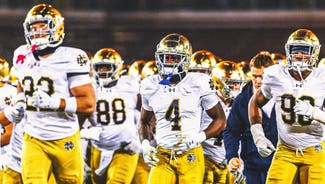
How Florida A&M coach Jake Gaither helped save Bob Hayes' NFL career
By RJ Young
FOX Sports College Football Writer
Editor's Note: As part of FOX Sports' series of Black History Month Stories, writer RJ Young is examining the players, teams and moments that changed college and professional football.
Read the rest of the series:
When the Kansas City Chiefs were Pro Football's Champions of Change
"Mobile, agile, hostile."
That’s how Jake Gaither, head football coach at Florida A&M University from 1945 to 1969, liked his Rattlers to play.
Call it a slogan, call it coachspeak — it doesn’t matter what you call it because Gaither backed it up by overseeing a quarter-century of mobile, agile and hostile dominance at the Tallahassee school.
By the time he retired from coaching, Gaither had a career record of 204-36-4. He had stocked the FAMU trophy room with 20 Southern Intercollegiate Athletic Conference titles, one AP small college national title and eight Black college national championships — the title belonging to the best team among historically Black colleges and universities.
That’s the record of a man who was undeniably one of the greatest college football coaches to ever walk the sideline.
But counting all of Gaither’s accomplishments only begins to tell the story of his impact on the sport.
Gaither believed in his players, went to bat for his players, willed his players to success — and they responded. Thirty-six of them made All-America teams under Gaither, and 42 made the NFL.
He didn’t have children, but he "clung to his players because they were his sons," said Derrick E. White, professor of history at the University of Kentucky and author of a book on Gaither’s FAMU legacy.
In the case of Gaither’s most famous pupil, that closeness not only saved the player’s future but also saved the United States a pair of Olympic Gold medals.
"Bob Hayes loved Jake Gaither," White said. "He was the father figure he clung to."
Yes, the Bob Hayes. Olympic champion sprinter Bob Hayes. Dallas Cowboys Ring of Honor member Bob Hayes. Three-time All-Pro wide receiver Bob Hayes. Super Bowl Champion Bob Hayes.
The man whose speed is said to have inspired NFL zone defenses because there was no such thing as containing him in man coverage.

Bob Hayes was enshrined in the Pro Football Hall of Fame in 2009 after an 11-year NFL career in which he caught 371 passes for 7,414 yards and 71 touchdowns.
If it hadn't been for Gaither, the legend of "Bullet" Bob probably never would have come to be.
When Hayes was a freshman at FAMU — before he’d played one snap of varsity football — he was wrongfully arrested. One of his teammates robbed an FAMU student, and Hayes was falsely accused and thrown in jail.
Hayes told his freshman coach and his father that he hadn’t committed the crime. When the news reached Gaither, he could’ve cut Hayes just for being implicated.
Many coaches would have done just that. After all, this was the same era in which Connie Hawkins, then considered the top basketball recruit in the country, lost his scholarship to the University of Iowa and found himself blacklisted by professional teams simply because his name was linked to a point-shaving scandal.
The Hawk was never even arrested or charged with a crime in that investigation. It was the same story for star hoopers Roger Brown and Doug Moe. There was no evidence that either player participated in rigging games, but because they were named in the NCAA gambling inquiry, Brown lost his scholarship to the University of Dayton, and Moe's career at North Carolina was cut short.
But Gaither refused to abandon Hayes. He spoke to FAMU’s freshman team coach, gathered information from his players and reached the conclusion Hayes was innocent.
Even then, it was almost too late to help Hayes, who said he was pressured into signing a false confession while in police custody. He hadn’t spoken to a lawyer, a parent or a school administrator, but he said he signed because he thought admitting his guilt would get him out of jail.
He spent a week behind bars. Meanwhile, Gaither hired a lawyer for Hayes out of his own pocket. There was no way to take back the confession, but when Hayes’ case went to court, Gaither pleaded with the judge for leniency.
"If you give me this boy for four years," Gaither said, "I guarantee you he won’t get in trouble, and he’ll make you proud of him."
Instead of prison, Hayes got 10 years’ probation.
The rest is history.

Hayes, racing for Florida A&M in 1962, held the world record in the 100-yard dash for more than a decade.
On the track-and-field oval, Hayes tied the world record in the 100-yard dash with a time of 9.3 seconds. He tied it again in 1962, when a new record had been set at 9.2. Then, in 1963, he set a new record — 9.1 seconds — that stood unbroken for more than a decade.
Hayes also led the Rattlers with 11 touchdowns that season, rushing for 260 yards on 55 carries and catching 15 passes for 401 yards.
The summer before his senior season at FAMU, Hayes represented the United States in the 1964 Tokyo Olympics, winning gold in the 100 meters and 4x100-meter relay.
But when he returned victorious to Tallahassee, Hayes found that his teammates had cooled to him.
Gaither sniffed out the problem. The rest of his players didn’t appreciate Hayes' dominating the spotlight.

Hayes crosses the finish line to win the Men's 4×100 meter relay at the 1964 Tokyo Olympic Games.
He told them: "You boys should be proud to have Bob Hayes as a member of the team. I heard some of you call him ‘Hollywood’ because he gets so much exposure. If you guys are jealous of Bobby Hayes, I know how every one of you can get as much publicity as Bob does."
How?
"Well, you only have to do one thing," Gaiter said. "Outrun him."
After Hayes’ Olympic triumph, Gaither asked Florida Governor Haydon Burns to pardon Hayes, and the governor did just that.
The Dallas Cowboys selected him in the 1964 NFL Draft, when Hayes had one year of college football left to play. As a rookie in 1965, he led the league with 12 receiving touchdowns and finished fourth in receiving yards with 1,003.

Hayes tries to break away from Colts linebacker Mike Curtis during the Cowboys' 16-13 loss in Super Bowl V in 1971.
In 11 NFL seasons, Hayes racked up 7,414 receiving yards and 76 total touchdowns. He was enshrined in the Pro Football Hall of Fame in 2009.
Through it all, he remained close with the college coach who stood up for him during his most vulnerable moments.
When Gaither died in 1994, Hayes was one of hundreds crying at his funeral. "He was my friend, my coach, my mentor," Hayes said, "but most of all, he was my father."
That’s what happens when you save someone’s life. They count you as family.
RJ Young is a national college football writer and analyst for FOX Sports. Follow him on Twitter at @RJ_Young. Subscribe to The RJ Young Show on YouTube. He is not on a StepMill.










